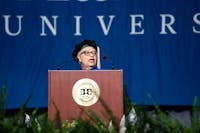Thoughtful new film is satisfying to watch
Dubbed Paul Thomas Anderson's Scientology movie, The Master is part voyeuristic dip into Dianetics, part fictionalized documentary about larger-than-life cult leader Lancaster Dodd (Philip Seymour Hoffman) and his manic follower, Freddie Quell (Joaquin Phoenix). Shot in lush, life-like 70 millimeter (think The Tree of Life and Samsara), the film depicts what can happen during the spiritually fertile period after wars.
A slave to his post-traumatic stress condition, World War II Navy veteran Freddie can't hold a job. A drunk, he concocts moonshine out of paint thinner, darkroom chemicals and household cleaners. He brawls with customers and coworkers alike until he stumbles back to sea and onto the ship of Lancaster Dodd, creator of the Cause-a movement with strong echoes in Scientology.
Like Anderson's last two films, Punch-Drunk Love and There Will Be Blood, The Master offers its alcoholic antihero a makeshift family to help him cope. Dodd and his disciples promise Freddie meaning. This proves no easy feat: Freddie must revisit trillions of years of past trauma in order to free himself in a process called "time-holing."
But the Cause is full of contradictions. Dodd urges his followers toward existence, but his time-hole sessions take place in the past. He claims that we're trapped in vessels (our bodies) through multiple rebirths, yet his prot?(c)g?(c)s are obsessed with their respective vessels. Gatherings are often an incestuous haze. Dodd's son, Val (Jesse Plemons), at one point says to Freddie: "He's making all this up as he goes along. You don't see that?"
The Cause and its failing aren't the point of the movie, but the implications of the movement are. It's a theory soaked in nostalgia, in a yearning for something intangible. After an auditing session with Dodd, Freddie remembers his wartime sweetheart, Doris (Madisen Beaty). When Freddie goes to find her, she has moved south. He asks her housemate, in a mood both somber and playful, "She still ugly?"
It's this kind of comic relief that makes Anderson's otherwise aching film playfully work. The heavy question marks of life are usually countered with dark comedy. For instance, when Freddie attempts to quit alcohol, Dodd's wife, Peggy (Amy Adams), says to him: "You can't take this life straight, can you?"
The Master tries to captures a still moment on a moving train. It grapples with the elusiveness interwoven in relationships, in spiritual enlightenment. Anderson successfully depicts the homing device in all of us, if we don't know exactly where that home is.
In an interview with the Huffington Post, Anderson said: "People have attractions to somebody that's probably not good for them, or an attraction to somebody who's a runner, you know? That attraction the Master has for Freddie-absolute sheer excitement at the thrill of the possibility that he may leave or do something crazy at any moment."
In his final words to Freddie, Dodd gives a haunting rendition of Ella Fitzgerald's song "Slow Boat to China," "I want to get you on a slow boat to China/All by myself, alone," he sings, "Get you and keep you in my arms evermore/Leave all your lovelies weeping on the far away shore." If someone who's supposed to be the Master of his emotions can't rationalize his longing, who can? Anderson doesn't give us the answer, but he asks the right questions.
*



Please note All comments are eligible for publication in The Justice.